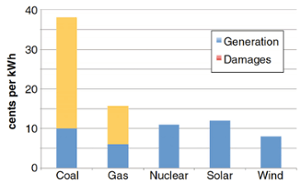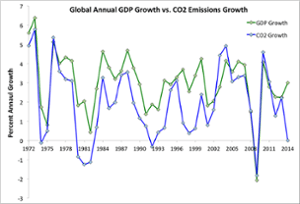Fossil fuels are way more expensive than you think
Posted on 18 March 2015 by dana1981
A new paper published in Climatic Change estimates that when we account for the pollution costs associated with our energy sources, gasoline costs an extra $3.80 per gallon, diesel an additional $4.80 per gallon, coal a further 24 cents per kilowatt-hour, and natural gas another 11 cents per kilowatt-hour that we don’t see in our fuel or energy bills.
 Levelized generation costs for new US electricity generation and environmental damages by fuel type. Source: Climatic Change, Shindell (2015).
Levelized generation costs for new US electricity generation and environmental damages by fuel type. Source: Climatic Change, Shindell (2015).
The study was done by Drew Shindell, formerly of Nasa, now professor of climate sciences at Duke University, and Chair of the Scientific Advisory Panel to theClimate and Clean Air Coalition. Shindell recently published research noting that aerosols and ozone have a bigger effect on the climate in the northern hemisphere, where humans produce more of those pollutants.
That research led Shindell to question current estimates of the true costs of our energy sources. Much research has gone into estimating the social cost of carbon, which attempts to account for the additional costs from burning fossil fuels via the climate damages their carbon pollution causes. However, this research doesn’t account for the costs associated with other air pollutants released during fossil fuel combustion.
For example, depending on how much more we value a dollar today than in the future (a factor known as ‘discount rate’), Shindell estimates carbon pollution costs us $32 per ton of carbon dioxide emitted in climate damages, and another $45 in additional climate-health impacts like malnutrition that aren’t normally accounted for.
But Shindell also estimates that carbon emissions are relatively cheap compared to other fossil fuel air pollutants. For example, sulfur dioxide costs $42,000 per ton, and nitrous oxides $67,000 per ton! However, less of these other pollutants are released into the atmosphere during modern fossil fuel combustion.
Electric Cars Cheaper than Gasoline Powered
For an average American car (26 miles per gallon), Shindell estimates that the air pollution emissions altogether cost us $1700 in damages per year. In comparison, emissions from energy to power an electric Nissan Leaf would cost us $840 even if purely powered by coal, and $290 if fueled by electricity supplied entirely from natural gas. These costs would become negligible if the electricity came from renewable or nuclear power. Electric vehicles (EVs) are clearly the winners in this cost comparison.
Hence environmental damages are reduced substantially even if an EV is powered from coal-fired electricity, although they are much lower for other electricity sources
The Needed Energy Transition May Have Begun in 2014
The key conclusion from Shindell’s study is that fossil fuels only seem cheap because their market prices don’t reflect their true costs. In reality they are remarkably expensive for society, but taxpayers pick up most of those costs via climate damages and other health effects. Those who argue that we need to continue relying on fossil fuels – like former popular science writer Matt Ridley – just aren’t accounting for the costs of pollution.
These air pollution costs are effectively a massive subsidy, and Shindell likely underestimated their size. When I asked Shindell if he had accounted for recent research by Moore & Diaz showing that climate change slows economic growth, he said,
I saw the Moore and Diaz paper, which was quite interesting, but after my paper had already been accepted so it didn’t make it in there. Indeed if growth is slowed by climate change as in their study, the associated social costs could be much larger ... But in general, this is only one of several possible reasons that my values are likely conservative as I’ve left out many things that I didn’t know how to put a price on. That includes the influence of pollution on cognitive function decline, on IQ, and on mental health, the influence of energy on freshwater resources, on national security (e.g. military spending related to oil/gas supplies), the impact of climate change on biodiversity, the effects of ocean acidification, etc.
This research shows that we need to transition away from fossil fuels not just tomitigate the risks associated with climate change, but to reduce the economic and health impacts of air pollution in general. Fortunately there was some good news this week suggesting that we may be on our way to making this transition. TheInternational Energy Agency (IEA) reported,
global emissions of carbon dioxide from the energy sector stalled in 2014, marking the first time in 40 years in which there was a halt or reduction in emissions of the greenhouse gas that was not tied to an economic downturn ... In the 40 years in which the IEA has been collecting data on carbon dioxide emissions, there have only been three times in which emissions have stood still or fallen compared to the previous year, and all were associated with global economic weakness: the early 1980’s; 1992 and 2009. In 2014, however, the global economy expanded by 3%.
When we examine the data, 2014 indeed stands out. With 3% GDP growth, it’s the first year on record that energy-related CO2 emissions didn’t increase and GDP nevertheless grew by more than 2%.
The IEA reports that the stagnation in carbon pollution stemmed from a transition away from fossil fuels rather than a drop in energy use due to poor economic conditions, as had been the case in previous years where CO2 emissions didn’t grow.































 Arguments
Arguments































I like that studies of this sort help make people aware of the hidden costs of the fossil fuels we use. I wonder how much more would be added by including the cost of oil spills?
Then again, in a way the added cost is misleading. When parts of Antarctica melt from too much CO2 in the atmosphere, no amount of money can put that ice back. When a beautiful beach is submerged by rising seas it can't be replaced with a stack of $100 bills.
I think a lot of people don't realize that the effects of global warming as almost completely irreversible. When we limited sulfer pollution, the acid rains stopped and the forests and streams recovered. When we stopped emitting CFCs the whole hole in the ozone begain to shrink.
The changes to the climate caused by humans are not like that. They are pretty much permanent, unless you consider time scales greater than 1000 years.
Social cost of goods or technologies is well known: economist call it externality. The problem is that is a type of indirect cost. It's really hard to change it in a direct cost (with a taxation or with law in order to avoid pollution). And this not only because population has to accept this change, but also because in a global market if only one nation (even if the first economic power one like USA) will support strongly (partially, with investment both on fossil both on revewable is not so effective) this change the other competitors (China, Brasil, Russia etc etc) will take commercial advantages avoiding (or simply delaying) this pollution tax.
Regarding Nuccitelli graph I hope that 2014 will not be an isolated year but the beginning of a new trend of decoupling. Looking through data there are also 1980-81 and 1992 with GDP increase (around 2%) and decreease of CO2 emission while durimng 1994 and 1998 a GDP increase at more or less 3% was done with a small CO2 increase (around 0,5%).
Another consideration is that any developed activity based on a practice like burning up non-renewable resources fundamentally cannot be continued. The economic system response is that scarcity will make the activity cost more. What really happens is a few people figure out how to be the ones to benefit most to the bitterest of ends that they can get away with. That includes wars and overthrowing governments and setting up indebted poor nations so they can displace self-sufficient tribes to get the cheapest possible access to the limited resource they wish to be the maximum beneficiaries of in the short-term, the only term that matters to them in their financially focused pursuits (and a lot of research indicats thta people motivated by financial pursuits are less caring of the consequences of their actions. So all rich people are not a problem. Only those who strive to be richer any way they can get away with are a problem).
The lack of a future for such activities and the damaging actions taken by powerful wealthy pursuesr of more for themsleves needs to be included in the evaluation.
In addition, many economic assessments of the 'overall economics' claim that reducing the burning of fossil fuels 'costs more' than dealing with the consequences. Those evaluations are fundamentally flawed because there should never be any 'consequences to be faced by future generatons' created by the pursuits of personal benefit by any in a current generation. It should not matter how wealthy some people in a current generation can get if that wealthy way of life cannot be continued indefinitely on this amazing planet with all others developing to live that way if they wish to.
The current socio-economic-political systems are motivated by 'some trying to win what they want to the detriment of others'. The concept of developing an eternally enjoyable way of living that all humanity can enjoy if they choose as part of the robust diversity of life is contrary to the current systems that encourage a few to fight to dominate or 'win over' all others at the expense of others.
@O.P.O.F: I agree with your comment except for the point that the current technical-economic global system based on consumption of not-renewable resources cannot be continued. The very big problem is that cannot be for a long time (50 years or 100-150 years from now, difficult to say without crystal ball) but can be and it is happening in the real world, years after years without any significative change on the base path of mankind activities (using 15 Gtoe/year)
alby,
I agree with your clarification about what can be continued, but would further clarify that since this planet is expected to be habitable for several hundred million more years, any activity that can be continued for 100 years or even 1000 years is essentially pointless, unless the benefit created from that short burst of unsustainable activity will continue to be a benefit for everyone for a few hundred million years.